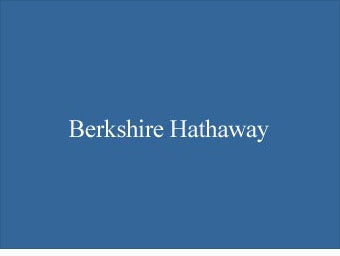Warren Buffett asked for a Berkshire Hathaway Inc. (NYSE:BRK.B) bear to attend this year’s annual meeting to lob questions at him and Charlie Munger.
“I just thought it would make it more interesting. The crowd can hear someone who thinks the stock is overpriced, or that it’s all a house of cards, or whatever it may be,” Buffett said.

“Think of tough questions,” Buffett told Kass on Monday. “See if you can drive the stock down 10%.”
Buffett can cheerfully — almost mockingly — invite a Berkshire Hathaway Inc. (NYSE:BRK.B) bear on stage with him in part because he has little interest in short-term volatility. “Berkshire Hathaway Inc. (NYSE:BRK.B) has gone down 50% four times in its history,” he said this week. “When that happens, if you’ve got money, you buy it.” Most CEOs would view their stock falling 50% as a personal failure. Buffett just looks at it as something stocks do from time to time.
I own Berkshire stock, and I think it’ll do well over the coming years and decades, but I know it’s a fallible company. It has faults. It makes mistakes. Someday, it will make a really big one.
But most of the bearish cases I hear aren’t very persuasive. Here’s a rebuttal to the common ones.
Berkshire is so big that it’s too hard to outperform
First, not being able to outperform isn’t an argument to short a stock. If the S&P 500 returns 9% and Berkshire returns 8%, those shorting Berkshire will lose.
And people have been worried that Berkshire is too big to outperform for literally decades. Buffett first warned his shareholders that size would inhibit returns in 1973. In 1983, he pointed out that Berkshire had earned 22% over the previous 20 years. “Considering our present size, nothing close to this rate of return can be sustained,” he wrote. “Those who believe otherwise should pursue a career in sales, but avoid one in mathematics.”
Over the next 20 years, Berkshire’s book value grew at an average of 24.8% per year.
Despite annual warnings that its size prevents big gains, Buffett has been able to put tens of billions of dollars to work over the last five years at enviable rates of return. Some of Berkshire’s most lucrative recent investments, like deals with Bank of America and Goldman Sachs, were accomplished not in spite of its size, but because of it. Berkshire won’t earn 25% a year like it used to. But it’ll likely earn more than most companies.
Buffett is old. He’ll die someday. That will be bad for Berkshire Hathaway Inc. (NYSE:BRK.B).
This is the most rational argument to avoid Berkshire, but I think it’s overblown.
Berkshire has almost half a trillion dollars in assets, consisting of everything from Wells Fargo stock to Dairy Queen to jewelry stores to car insurance. Buffett’s day-to-day involvement with these investments is virtually nil.
When Buffett dies, Geico won’t sell less insurance. Burlington Northern won’t haul less freight. American Express won’t run out of rich people. Believe it or not, Coke will still taste just as good. The intrinsic value of Berkshire’s existing holdings shouldn’t change one bit after Buffett passes.
What will change is the company’s ability to reinvest earnings as successfully as it has. “There will never be another Warren Buffett,” says Kass. He’s right, of course.
But don’t you think the market knows that? Do you think the market is oblivious to Warren’s age and hasn’t priced in the possibility of his not-too-distant death? Sorry, it’s not that blind. That brings us to the last point.





